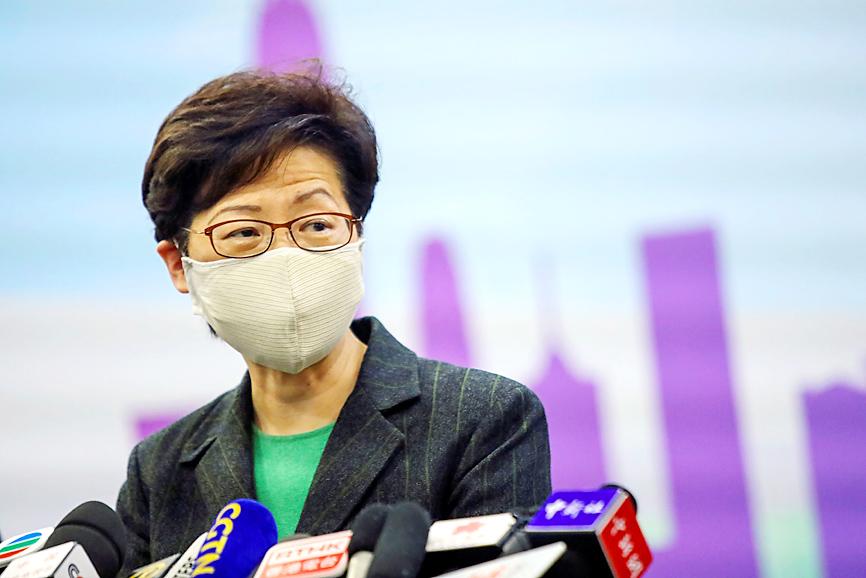Hong Kong Chief Executive Carrie Lam (林鄭月娥) yesterday called on the US to stop interfering in the territory, and that she had discussed COVID-19 controls and economic relief with mainland Chinese officials during her three-day trip to Beijing.
Speaking to reporters in Beijing, Lam said that the Chinese government would support Hong Kong’s competitiveness, as well as tech innovation in the Asian financial hub.
Lam said that whoever wins the US presidential election should end US interference in the internal affairs of the territory and China overall.

Photo: Reuters
She accused the administration of US President Donald Trump of repeatedly interfering over the past year, citing US sanctions on officials, including herself, and the suspension of special trading conditions previously granted to Hong Kong.
“That is totally unreasonable,” she said at the news conference. “I hope that they will come back to normalcy and accept that the relationship has to be built on mutual respect and cooperation.”
The US earlier this year took issue with China’s enactment of a new National Security Law.
The Trump administration backed democracy activists who said that the legislation ended the “one country, two systems” framework under which Hong Kong is part of China, but given a high degree of autonomy over local affairs.
Lam said that the legislation has been an effective deterrent after pitched battles between demonstrators and police during protests last year.
“Hong Kong has recovered its stability and has not seen any large-scale violent incidents,” Lam said. “With this stable environment, we can focus on economic development and improving people’s lives.”
Lam was praised by Chinese Vice Premier Han Zheng (韓正), who said that her government had “overcome all kinds of difficulties and dealt with the challenges.”
Hong Kong was wracked by protests last year demanding fully democratic elections and opposing China’s expanding influence in the territory’s affairs.
Han, one of seven members of the Chinese Communist Party’s top leadership body, praised Lam’s government for its handling of the pandemic, easing the economic burden on the population, implementing the national security legislation and protecting the stability of Hong Kong.

The Central Election Commission has amended election and recall regulations to require elected office candidates to provide proof that they have no Chinese citizenship, a Cabinet report said. The commission on Oct. 29 last year revised the Measures for the Permission of Family-based Residence, Long-term Residence and Settlement of People from the Mainland Area in the Taiwan Area (大陸地區人民在台灣地區依親居留長期居留或定居許可辦法), the Executive Yuan said in a report it submitted to the legislature for review. The revision requires Chinese citizens applying for permanent residency to submit notarial documents showing that they have lost their Chinese household record and have renounced — or have never

A magnitude 5.6 earthquake struck off the coast of Yilan County at 12:37pm today, with clear shaking felt across much of northern Taiwan. There were no immediate reports of damage. The epicenter of the quake was 16.9km east-southeast of Yilan County Hall offshore at a depth of 66.8km, Central Weather Administration (CWA) data showed. The maximum intensity registered at a 4 in Yilan County’s Nanao Township (南澳) on Taiwan’s seven-tier scale. Other parts of Yilan, as well as certain areas of Hualien County, Taipei, New Taipei City, Taoyuan, Hsinchu County, Taichung and Miaoli County, recorded intensities of 3. Residents of Yilan County and Taipei received

Taiwan has secured another breakthrough in fruit exports, with jujubes, dragon fruit and lychees approved for shipment to the EU, the Ministry of Agriculture said yesterday. The Animal and Plant Health Inspection Agency on Thursday received formal notification of the approval from the EU, the ministry said, adding that the decision was expected to expand Taiwanese fruit producers’ access to high-end European markets. Taiwan exported 126 tonnes of lychees last year, valued at US$1.48 million, with Japan accounting for 102 tonnes. Other export destinations included New Zealand, Hong Kong, the US and Australia, ministry data showed. Jujube exports totaled 103 tonnes, valued at

BIG SPENDERS: Foreign investors bought the most Taiwan equities since 2005, signaling confidence that an AI boom would continue to benefit chipmakers Taiwan Semiconductor Manufacturing Co’s (TSMC, 台積電) market capitalization swelled to US$2 trillion for the first time following a 4.25 percent rally in its American depositary receipts (ADR) overnight, putting the world’s biggest contract chipmaker sixth on the list of the world’s biggest companies by market capitalization, just behind Amazon.com Inc. The site CompaniesMarketcap.com ranked TSMC ahead of Saudi Aramco and Meta Platforms Inc. The Taiwanese company’s ADRs on Tuesday surged to US$385.75 on the New York Stock Exchange, as strong demand for artificial intelligence (AI) applications led to chip supply constraints and boost revenue growth to record-breaking levels. Each TSMC ADR represents